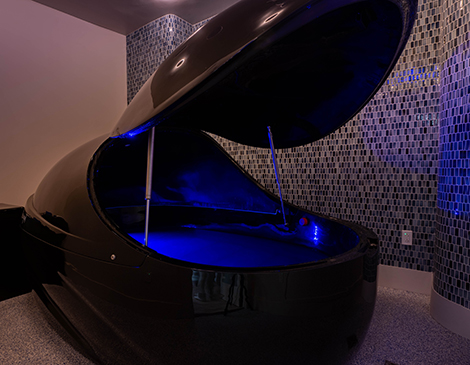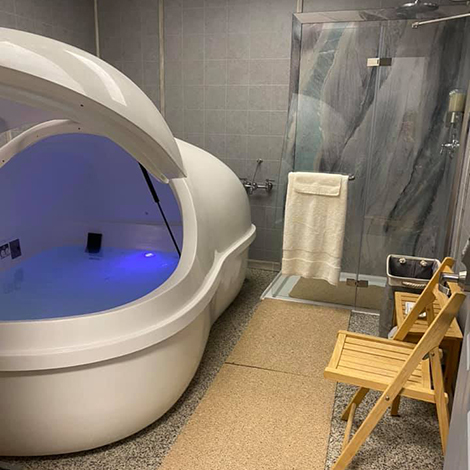The Rise of Float Spas in Cleveland: Finding Peace in the Pod
by Christina Rufo | Jan. 10, 2025 | 10:00 AM

Courtesy True Rest, Courtesy Soul Space, Courtesy Himalayan Cave
The first time I stepped into the “floatation” tank, I wasn’t sure what to expect. The idea of bobbing in a pitch-black pod filled with saltwater sounded ... odd. But within minutes, I was hooked. Floating isn’t just relaxing. It’s transformative.
Floatation therapy, often referred to as sensory deprivation therapy, is a unique wellness experience that combines the benefits of Epsom salts, weightlessness and deep meditation. By floating in a zero-gravity environment, often in a soundproof, light-free tank, participants can experience profound relaxation and healing. Since emerging more than 50 years ago, sensory deprivation float tanks have risen in popularity in Cleveland over the past decade.
As I climb into a tank at True Rest filled with a few feet of lukewarm water mixed with a thousand pounds of Epsom salts, the buoyancy allows me to float effortlessly. Once the lid closes, it’s completely silent and dark. No distractions, no notifications, just you and your thoughts — or lack of them, as it turns out. I remind myself that I am in complete control of whether or not to close the lid, and that I am able to exit the tank at any time if needed.
“I always tell people who are worried about being claustrophobic that you can just push the lid up if you really feel uncomfortable. You don't have to have the lid down. It does not lock. You are in full control of it,” explains Jamie Fiore, the chief operating officer of Soul Space, a wellness spa in Cleveland. “It's on a hydraulic arm, and basically, when you get in it, you pull it down, and then when you want to get out, you just push it up, and it automatically comes right back up."
At first, it’s a little strange. Your mind races, or you might feel antsy. But then, something clicks. Your body starts to let go of tension you didn’t even realize you were holding, and your brain shifts into a meditative state.

(Courtesy Soul Space)
For me, floating inside this pod feels like floating in outer space. I will admit, it may be hard to find the groove of meditation, but even if you have trouble staying still, you can still reap the benefits of the therapy.
“There's a lot of different medical benefits, but just the deep, relaxed state that it puts you in, the feeling of weightlessness and detachment from everything, is why I think float therapy is very unique. You're in full darkness, no interruptions, just complete disconnection, which, in today's day and age, it's very seldom that we do that," says Fiore.
After my first session, I feel lighter, physically and mentally. My muscles, which are usually tight, feel loose. Mentally, I am calmer, and I am able to sleep without any additional supplements, such as my usual nightly melatonin gummy.
Dr. Jacob Wolf is a naturopathic doctor and licensed acupuncturist with University Hospitals Connor Whole Health program. He shared some insight as to how float therapy affects the human body from a medical perspective.
Sign Up to Receive the Cleveland Magazine Daily Newsletter Six Days a Week
The Epsom salts ( aka, magnesium sulfate) help keep you buoyant. That zero-gravity environment takes the pressure off your joints and spine, allowing your body to naturally realign and heal.
“There actually is some data from that. The floating kind of gets rid of all the pressure,” explains Wolf. “The combination of the floating plus the warmer temperature of the water, and potentially the magnesium, can help [blood] vessels to dilate some and allow your body to circulate blood a little more easily. It can also help to regulate blood pressure to some degree.”
For those concerned about the cleanliness of the water, most float pods are self cleaning. “Our float tank is a $24,000 float tank. It has a filtration system in it that can filter a 20,000 gallon pool,” says Fiore. “So after somebody does a float session, it goes through a 15-minute filtration cycle. And basically the water that's in the float tank gets filtered 75 times."
Without any outside stimuli, there is a decrease in cortisol, the stress hormone, production, allowing your mind to shift into a slower brainwave state. The result? Deep relaxation, better focus and, often, a post-float euphoric moment of creativity or clarity, Fiore explains.

(Courtesy Himalayan Cave)
“Cortisol is one of the ways that our body responds to stress. Some people who are in a chronically stressed or anxious state can have high cortisol, so it kind of keeps that body in that kind of fight or flight mode,” Wolf says.
Wolf prescribes float therapy to his patients for a variety of circumstances such as athletes, individuals with muscle discomfort or arthritis.
“I think it's kind of a general calming and relaxing experience, similar to someone who might go for a massage to relax. It's a good option, plus it's low impact,” says Wolf. “With floating you get the pain relief benefits, plus the relaxation benefits of pain relief as well.”
Where to Float in Northeast Ohio:
True Rest Float Spa: 21643 Center Ridge Road, Rocky River, 440-333-7378, truerest.com/
Stella Luna Counseling and Wellness Center: 17951 Jefferson Park Road, Suite 100, Middleburg Heights, 440-879-8517, stellalunatherapy.com
Soul Space: 5605 Tillman Ave., Cleveland, 216-377-1786, soulspace.net/
The Himalayan Cave: 9130 Tyler Blvd., Mentor, 440-290-0999, thehimalayancave.com
Mystic Float and Wellness Center: 4612 Tuscarawas St. W., Canton, 330-915-6045, mysticfloatwc.com/
For more updates about Cleveland, sign up for our Cleveland Magazine Daily newsletter, delivered to your inbox six times a week.
Cleveland Magazine is also available in print, publishing 12 times a year with immersive features, helpful guides and beautiful photography and design.

Christina Rufo
Christina is a passionate reporter on Cleveland's culture and dining scene, compiling Cleveland Magazine's monthly dining guide. A graduate of West Virginia University's journalism school and the New York University Publishing Institute, her work celebrates the people, plates and parties that make Northeast Ohio shine.
Trending
-
1
-
2
-
3
-
4
-
5










